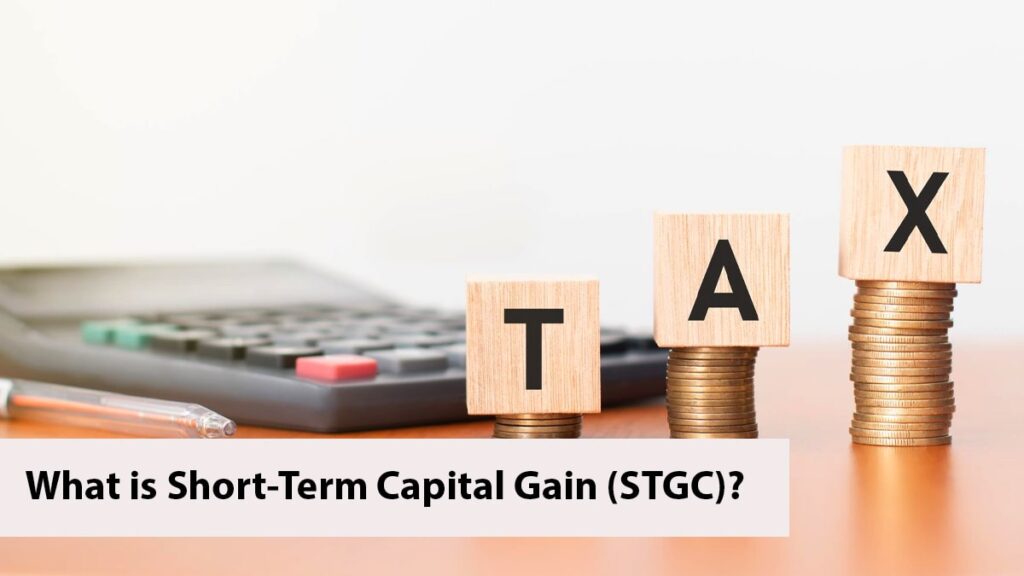Whenever an asset is sold it provides us with an opportunity to make money. Whether it’s making money from money, or making money from real estate, it becomes important to understand taxes involved in the sale.
Taxes can increase or decrease your profits so it becomes very important. To calculate taxes, there are various factors involved but the most important factor on which the entire calculation of the tax depends is the Whether the profit happened due to short-term capital gain or long-term capital gain.
In this article, we will discuss What is Short Term Capital Gain (STGC), List of Assets considered as Short-term capital gain, taxes on STGC, and much more.

What is Short-Term Capital Gain (STGC)?
Short Term Capital Gain is any capital gain or profit that you made by selling your asset within the time frame of 36 months unless exempted will be considered Short Term Capital gain and will be liable for STGC Taxes.
Example- Let’s take an example of Ram who bought a house worth Rs.10 Lakhs and within 11 months sold the house at 12 Lakhs. So, the capital gain will be Rs. 2 lakhs and since the time frame of sale and purchase is 11 months, so, it will be considered a Short-term capital gain.
List of Assets Considered as Short-Term Capital Gain (STGC)
The following are the assets considered as Short-Term Capital Gain (STGC)-
- Stocks and Equities: Profits from buying and selling shares of publicly traded companies
- Bonds: Gains from the sale of bonds held
- Real Estate: Profits from the sale of real estate held
- Mutual Funds: Short-term gains from the sale of mutual fund shares held
- Options and Futures Contracts: Gains from trading options and futures
- Precious Metals: Short-term profits from the sale of gold, silver, or other precious metals held
- Collectibles: Short-term gains from the sale of collectibles like art, antiques, and coins held
Taxes on Short Term Capital Gain (STGC)
Short-term Capital gains are taxable as per the Income Tax Act and you’ll have to pay the taxes as per your Income Tax Slab. To calculate the Capital gain tax, you’ll need to know the formula which is as follows-
Formula to Calculate Short-Term Capital Gain:
Short-term capital gain= (full value consideration) – (cost of acquisition + cost of improvement + cost of transfer)
Example:
Let’s say Ram purchased a property for 20 lakhs and kept it for 11 months and then sold it for 25 lakhs. During the ownership time, the cost of repair and renovation cost him Rs.1 Lakh and the total cost of transfer cost him Rs.2 Lakhs. So as per the short-term capital gain formula, the short-term capital gain he earned will be as follows-
Short-term capital gain= Rs.25 lakhs- (Rs.20 lakhs + Rs.1 lakhs + Rs.2 lakhs) = Rs.2 Lakhs/-
So, the final capital gain considered will be Rs.2 Lakhs and Ram has to pay taxes for Rs.2 Lakhs only.
Full Value Consideration
The full Value of Consideration is the total sale value that the assets have been sold off with. This will also include the profits that you’ve made so, when you deduct your original buying price along with other costs you’ll find the Short Term Capital Gain.
Cost Of Acquisition
The cost of Acquisition is the cost that you put in to acquire that asset. Generally, the amount that you invest in acquiring the asset is considered as the cost of acquisition for example- You purchase a flat for Rs.20 Lakhs so the cost of acquisition is Rs. 20 lakhs.
Cost Of Improvement
Any renovation cost or interior development cost involved in upscaling the asset will be considered the Cost of Improvement. This majorly applies to Real Estate assets which require quite a lot of renovation before upselling the property.
Cost Of Transfer
Transferring assets involves various fees, stamp duties, cess, and other fees which will be considered as the Cost of Transfer that the seller has to bear. Therefore, the Income Tax Act provides provisions to consider these costs as expenses and can be deducted from your profits while calculating the Short-Term Capital Gain Tax.
Exemption on Short-Term Capital Gain (STGC) under Section 111A
The following are some of the exemptions that Section 111A of the Income-tax Act provides-
- Short-Term Capital gain provides an exemption on the sale of the Equity Shares which has been earned through an unrecognized Stock Exchange
- Any sale of shares apart from equity shares will be exempted from Short-Term Capital gain tax including the sale of non-equity-oriented Mutual Funds
- Sale of bonds, government securities, and debentures are also exempted from Short-Term Capital Gain tax
- Profit arising out of the sale of immovable property, silver, gold, etc. is exempted
FAQ
Yes, short-term Capital Gain is Taxable as per your Income tax slab.
You can avoid paying Short-term Capital gain by holding on to the asset so that it converses into long-term capital gain. Another method is to offset your capital gain from losses that you made with another asset like a business, etc. You can also show your expenses and deduct those expenses against the capital gain to reduce your tax liability.
You can deduct Marketing costs, platform costs, registration, brokerage, and other associated charges incurred in due course of the transfer or sale of an asset as expenses.
Any capital gain less than Rs.1 Lakhs will not be considered for tax however, while calculating overall Income Tax, you’ll have to show the profits earned on the sale of the asset.



